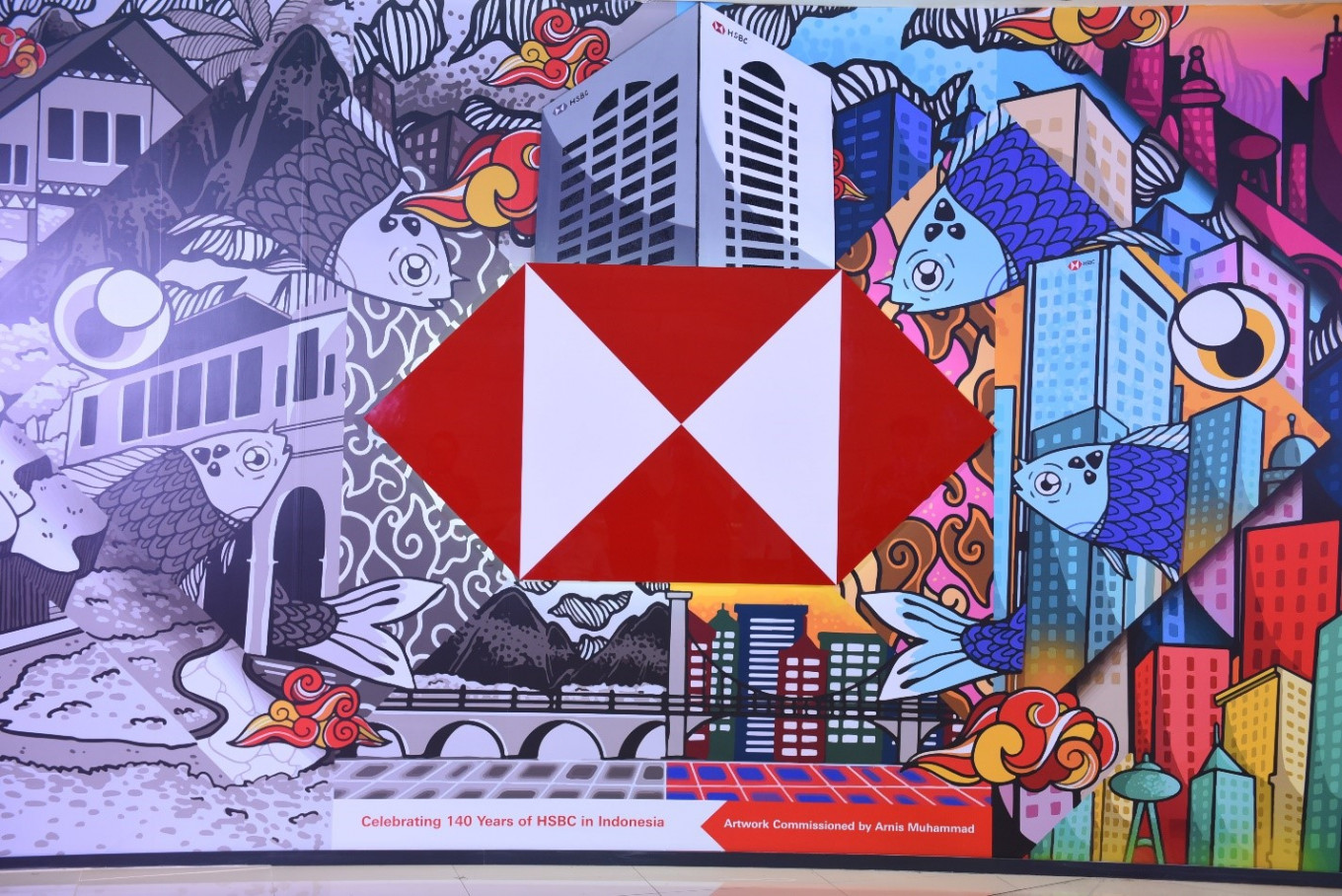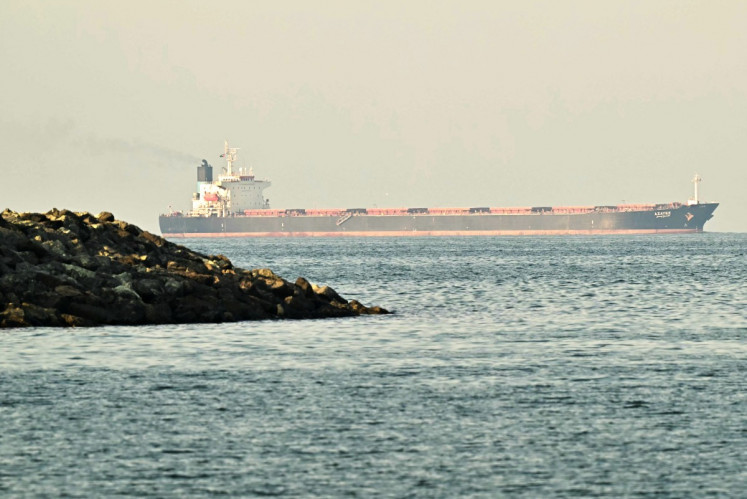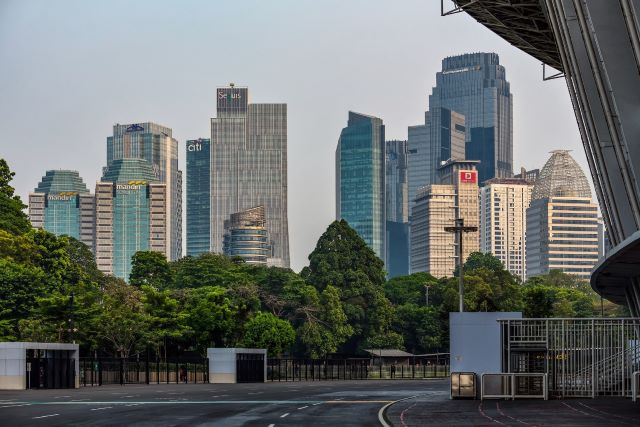Popular Reads
Top Results
Can't find what you're looking for?
View all search resultsPopular Reads
Top Results
Can't find what you're looking for?
View all search resultsFrom sugar to sustainability, HSBC’s evergreen presence in Indonesia for 140 years
HSBC Indonesia began its humble beginnings in 1884 by opening an office in Batavia (presently Jakarta).
Change text size
Gift Premium Articles
to Anyone
by Francois de Maricourt, President Director of HSBC Indonesia
HSBC Indonesia began its humble beginnings in 1884 by opening an office in Batavia (presently Jakarta). At the time, the port city played a crucial role in shipments of goods to different countries in the region and even to a different continent.
Originally established to facilitate the flourishing sugar trade across the maritime route, HSBC expanded its operations to Surabaya, home to another major seaport, some 12 years later. Since its inception, HSBC has been continuously evolving, and now, 140 years later, over 2,800-strong personnel serve the needs of private businesses, state-owned enterprises, as well as individuals across 34 branches offices in 17 cities in Indonesia.
Yet, HSBC’s journey goes beyond the number of branches, international networks, or a state-of-the-art digital platform. Our shared history stretching well over a century in Indonesia, immersed in the nation’s rich and diverse cultures, makes HSBC more sensitive towards different nuances and norms.
That, in combination with our strong international network, helped us to go from strength to strength. Another aspect that I found most pleasing during my tenure here is the social fabric and resiliency of Indonesian communities. These might be difficult to quantify, but the country has shown, over and over again, that it can thrive when the going gets tough.
Indonesia’s rising importance to the global economy
Indonesia’s importance to the global economy has been steadily rising in recent decades. The country is not only the sole representative of Southeast Asia in the G20, Indonesia’s vast natural resources makes it among the key stakeholders for the successful transition towards sustainability and low-carbon economy.
Indonesia has various prospective sectors, with EV nickel battery production and its sub-industries among the standouts. The country’s rich nickel deposits and downstreaming policy meant that Indonesia can, overtime, has the complete suite of battery supply chain that is crucial for the global pivot away from internal combustion engines.
Solely looking at the value chain standpoint from mines to processed metals to battery manufacturing, Indonesia stands to benefit from billions of dollars in foreign direct investments (FDIs) and its effects on greater employment opportunities as well as improvements in technical and practical knowledges.
Potential of renewables and nature-based solutions
The government’s strong commitment to achieve net-zero emissions by 2060 also opens up numerous opportunities on renewable energies, nature-based solutions, as well as advancing a financing model for early retirement of coal power plants–crucial for a widespread adoption in other emerging economies.
Sitting on the Ring of Fire, Indonesia holds the largest geothermal potentials globally and policymakers have began engaging with its regional peers to create a cross-border renewable power transmission. The current advancements in engineering also meant that hydro and tidal energies, and most definitely solar power, will only get stronger in the future.
The state utility firm, Perusahaan Listrik Negara (PLN), pledged to source 75% of its additional power generation capacity from renewable energy. In and of itself already made up a huge bulk of the estimated USD 110 billion investments for power supply and transmission in the next decade.
The government’s policy to extend forestry moratorium curbed the deterioration rate of its rainforest and helped protect the second largest biodiversity in the world, alongside the commitment to phase out coal, create opportunities for daring entrepreneurs offering nature-based solutions.
Pilot projects from domestic and international companies, backed by a regulatory framework, for cross-border carbon capture utilization (CCU) also provided a glimpse on how Indonesia creatively turn its aging oil wells into a new sector in the transition towards low-carbon economy.
Demographic dividends and digitalization
Indonesia’s total population of around 270 million makes it the fourth largest in the world. On its own, the country makes up about 40% of total population in Southeast Asia, making the country a key gateway to the region as well as among a major hub in international trade.
Indonesia has 35 trade agreements, including the Regional Comprehensive Economic Partnership (RCEP), the largest trade pact which includes the likes of China, Japan, South Korea, and Australia.
When we zoom in on the demographics, about 25% of Indonesians are below 15 years of age, making it one of the fastest adopters of digital transformation globally as well as making a solid plank for demographic dividends over the next decade or two.
The start-up scene is buzzing, with young entrepreneurs tapping digital technology to connect with wide audience. Indonesia’s tech unicorns are creating forays into other countries, providing unique services while at the same time accumulating international know-hows.
Ascending to the 2045 Golden Age
Beyond the relatively new business opportunities in the Internet era, the digital economy also further stoke Indonesia’s fast-moving consumer goods (FMCG) sector–already inherently strong thanks to its population and rising middle class.
I can go on and on with a litany of prospects offered by Indonesia, but I don’t think anything less than an essay could do justice to the tremendous opportunities offered by this country. The government coined the phrase ‘2045 Golden Age’, both as aspiration and conviction for Indonesia leveraging all of its resources to become a higher-income country at its 100th anniversary.
It does not mean that the way forward will be all roses and sunshine but as this country has shown numerous times, its resiliency in the face of adversity and challenges is one of its dominant traits. With the increasing competition from other emerging markets for foreign direct investments, Indonesia needs to continue reforming its policies and regulations to make it easier to do business.
Should Indonesia plays its cards well, we can expect Indonesia’s GDP growth rate to climb to 5.8 percent by 2028, setting the tone for a higher expansion rate than the previous decade. The
past 140 years of our shared journey has given both HSBC and Indonesian tremendous window for co-learning, co-sharing, and collaborating.
Over the course of that period, so many things have changed, and will continue to evolve in the future. Yet, our key identities remain and even flourished with the nurture of time.
HSBC aims to be the preferred partner to supporting Indonesian companies in their overseas expansion and for global companies to invest in Indonesia, just like how the bank first opened its office to facilitate the sugar trade. The bank’s international network has helped businesses of the yesteryear to thrive and will continue to do so in this day and age–facilitating FDIs entering Indonesia, as well as accommodating native businesses to enter overseas markets.
We recently launched HSBC Business Guide to ASEAN and beyond which aims to be a resource for companies to gain in-depth analysis of local market dynamics, trends and strategic insights to tap opportunities across ASEAN, Middle East, India and China.
Secure digital platform for convenient and efficient banking services to best serve our customers, just like how we kept our ledgers safe and secure in the olden days. I am grateful to have been a part of this wonderful journey, having the first-hand experience of observing the resiliency of the Indonesian people, communities, and authorities during the global pandemic.
Here is me hoping that our shared journey thus far can open up a world of opportunity for Indonesia in years to come. Terima kasih. (ism)
Source: HSBC











